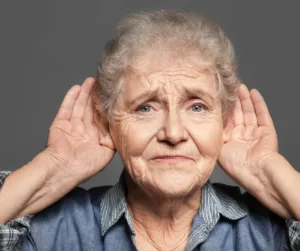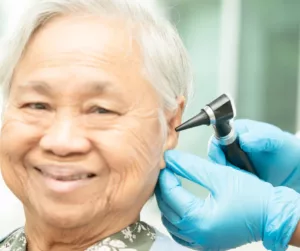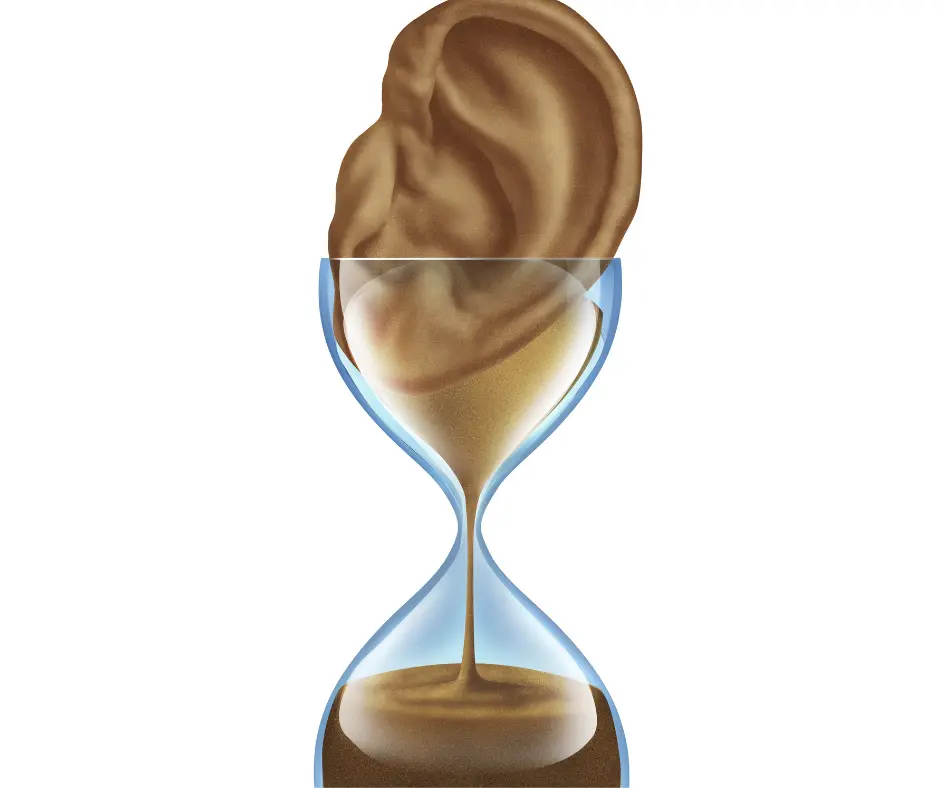What Causes Presbycusis? A Comprehensive Guide to Hearing Loss in Seniors
A Presbycusis Definition
Presbycusis, pronounced prez-buh-KYOO-sis, is an unavoidable aspect of aging, marking a gradual reduction in hearing ability. This age-related hearing loss, affecting about one in three adults over 65 in the U.S., often goes unnoticed due to its slow progression. The condition predominantly impairs the perception of high-pitched sounds, such as a phone ring or a microwave beep, while usually sparing lower frequencies. Surprisingly, nearly half of those above 75 experience this challenge. But what causes presbycusis? This hearing loss is more than just an inconvenience; it can interfere with understanding crucial information, like a doctor’s instructions, and can strain social interactions, potentially leading to isolation.
What Causes Presbycusis? Understanding the Science
Presbycusis, also known as age-related hearing loss, arises from a blend of biological and environmental influences. Here’s an in-depth look at the contributing factors:
Biological Factors:
- Inner Ear Changes: Most commonly, presbycusis results from alterations within the inner ear, especially the cochlea. Here, hair cells crucial for converting sound vibrations into electrical signals gradually deteriorate, impacting the sensitivity to high-frequency sounds.
- Auditory Nerve Degradation: This nerve plays a vital role in transmitting electrical signals to the brain. As we age, nerve fibers can sustain damage, impairing our ability to comprehend speech, particularly in noisy settings.
- Middle Ear Alterations: Comprising small bones and muscles, the middle ear aids in transmitting sound to the inner ear. Aging can stiffen these components, disrupting sound transmission.
- Central Auditory System Changes: Located in the brain, this system interprets auditory information. Age-related changes here can affect sound localization and speech comprehension.
- Genetic Predisposition and Health: A family history of hearing loss, coupled with conditions like diabetes and high blood pressure, can increase the likelihood of presbycusis.
Environmental Factors:
- Noise Exposure: Lifelong exposure to loud noises can hasten hair cell loss and intensify hearing loss.
- Medications: Certain drugs, including aspirin and some antibiotics, can negatively affect hearing.
- Occupational Hazards: Continuous exposure to work-related noise is a significant risk factor.
- Lifestyle Choices: Individual lifestyle habits and overall health significantly influence the progression of presbycusis.
Understanding the Cumulative Effect:
- Variability in Progression: The rate at which presbycusis develops varies greatly and is influenced by genetics, health, and lifestyle.
- Long-Term Development: This condition evolves over decades, with subtle initial changes accumulating over time.
- The Importance of Early Diagnosis: Detecting presbycusis early and intervening can greatly enhance quality of life. Regular hearing check-ups and timely treatments are essential.
By comprehending these factors, we gain insights into the science behind presbycusis, paving the way for better prevention, treatment, and management strategies. This understanding is crucial in addressing the complexities of what causes presbycusis and improving the lives of those affected.

What Causes Presbycusis Diagnosis? Common Symptoms of Presbycusis
Early detection is critical for effective management when it comes to presbycusis or age-related hearing loss. This section outlines the typical symptoms that individuals with presbycusis may experience, aiding in early diagnosis.
Typical Symptoms of Presbycusis:
- Challenges with High-Pitched Sounds: Difficulty in hearing high-pitched sounds, like consonants (s, f, p, k) or birdsong, is a common initial sign. This often results in trouble understanding speech, particularly amidst background noise.
- Speech Perception as Muffled: Many individuals report mumbled or unclear speech, impacting conversation comprehension.
- Increased Volume Needs: There’s often a need to raise the volume of televisions, radios, and other devices for clearer hearing.
- Struggles in Conversational Settings: Following conversations, especially in noisy environments or group discussions, becomes increasingly challenging.
- Trouble with Background Noise: Background sounds can significantly hinder the ability to understand speech in restaurants or crowded areas.
- Experiencing Tinnitus: Some individuals may have ringing or buzzing in their ears, known as tinnitus, which can accompany presbycusis.
- Phone Conversations Become Difficult: Understanding speech over the phone, particularly with speakerphones or in noisy surroundings.
- A feeling of Others Mumbling: There’s often a sensation that others are not speaking clearly, leading to misunderstandings.
- Difficulty Following Media: Watching movies or TV shows can become hard due to challenges in comprehending dialogue and sound effects.
- Loss of High-Frequency Environmental Sounds: Sounds like birdsong or rustling leaves may become inaudible, diminishing enjoyment of nature and music.
It’s important to remember that these symptoms can vary in intensity and may not be present in every case of presbycusis. Nonetheless, noticing these signs should prompt a consultation with a healthcare professional for a comprehensive hearing evaluation. Early identification and intervention can significantly improve management strategies, enhancing hearing and communication abilities.
The Connection Between Presbycusis and Cognitive Decline
The relationship between presbycusis, or age-related hearing loss, and cognitive decline has become a focal point in medical research, underscoring the need for early hearing interventions to support mental health.
Underlying Mechanisms of the Connection:
- Social Isolation: Hearing challenges can lead to decreased social interaction, fostering isolation. This lack of engagement can adversely affect cognitive function and mental health.
- Auditory Deprivation: Hearing loss reduces sensory input, depriving the brain of essential auditory stimulation. This can lead to diminished brain plasticity and cognitive decline.
- Increased Cognitive Load: Individuals with presbycusis often exert more effort to understand speech, placing additional cognitive strain. This extra effort can drain mental resources, impacting other cognitive abilities.
- Shared Pathological Factors: Certain studies propose that the biological processes causing presbycusis might also trigger cognitive decline. This could involve neurodegenerative pathways or vascular risk factors.
Evidence Supporting the Connection:
Research highlights the significant correlation between hearing loss and cognitive decline:
- Higher Risk of Dementia: Studies indicate that those with hearing loss are substantially more likely to develop dementia.
- Impact of Mild Hearing Loss: Research suggests even mild hearing loss can contribute to cognitive decline and memory issues.
- Positive Effects of Early Intervention: Utilizing hearing aids early has shown promising results in enhancing cognitive function and potentially slowing cognitive decline.
This emerging evidence underscores the importance of addressing hearing loss not just as a sensory issue but also as a critical factor in maintaining cognitive health. Understanding and acknowledging this connection is crucial in developing comprehensive care strategies for aging individuals.
Understand more about the link between dementia and hearing loss.

Preventive Measures to Delay or Reduce What Causes Presbycusis
However, certain strategies can help delay the onset of presbycusis and minimize its impact. Integrating these practices into your daily routine can effectively safeguard your hearing health.
Minimizing Exposure to Loud Noise
Reducing exposure to loud noise is crucial in preventing hearing damage. Here are some ways to protect your ears:
- Hearing Protection: Use earplugs or earmuffs in loud environments like concerts or when using power tools.
- Volume Control: Keep the volume on televisions, radios, and other devices at moderate levels.
- Limiting Exposure: Avoid long periods in noisy places and take breaks to rest your ears.
Managing Overall Health
Overall, health management plays a significant role in maintaining good hearing. Consider these health-related strategies:
- Healthy Weight: Maintain a healthy weight, as obesity can increase the risk of hearing loss.
- Regular Exercise: Engage in physical activities to enhance blood circulation, benefiting inner ear health.
- Chronic Condition Control: Keep conditions like high blood pressure and diabetes under control.
- Quit Smoking: Smoking hampers blood flow to the inner ear, so quitting benefits auditory health.
Adopting a Healthy Diet
A nutritious diet contributes to better hearing health. Here are some dietary tips:
- Balanced Diet: Eat plenty of fruits, vegetables, and whole grains.
- Limit Unhealthy Foods: Reduce your intake of processed foods and sugary drinks.
- Supplements: Consider taking vitamins and minerals as recommended by your doctor.
Learn more about supplements for hearing health.
Protecting Ears from Physical Damage
Physical protection of your ears is essential to prevent hearing loss. Here’s how you can protect your ears:
- Preventing Ear Infections: Treat any ear infections promptly to avoid hearing damage.
- Gentle Ear Cleaning: Clean your ears softly and avoid inserting objects into the ear canal.
- Head Injury Prevention: Use protective gear like helmets during risky activities.
Regular Hearing Screenings
Regular screenings are vital for early detection of hearing loss. They allow for timely intervention:
- Screening for Early Signs: Vital for individuals over 50, regular hearing checks can detect early hearing loss.
- Early Diagnosis Benefits: Early detection allows quicker intervention to slow down hearing loss.
Managing Stress and Maintaining a Positive Attitude
Managing stress and maintaining a positive mindset are essential for overall well-being, including hearing health:
- Stress Management: Techniques like meditation or yoga can help reduce stress, benefiting hearing health.
- Positive Outlook: A positive attitude can enhance overall health and support healthy aging.
Implementing these preventive measures can significantly improve your hearing, enabling you to maintain clear communication and enjoy life’s auditory experiences. Remember, proactive steps are key to safeguarding your hearing health.

Find Your Trusted Partner in Combatting Presbycusis
While presbycusis, or age-related hearing loss, currently has no cure, it’s far from a sentence to a life of diminished hearing. Various management and treatment options exist, significantly improving hearing ability and daily communication.
Amplification devices, particularly hearing aids, stand out as the most common and effective treatment for presbycusis. These electronic devices amplify sound across all frequencies, adapting the amplification to the individual’s unique hearing loss pattern. With a range of models available, such as behind-the-ear (BTE), in-the-ear (ITE), and completely-in-canal (CIC), there’s a solution to fit various preferences and needs.
Learn more about types of hearing aids.
The benefits of these treatments are multifaceted. They lead to improved hearing ability, enhanced communication and speech comprehension, and reduced feelings of isolation. This, in turn, fosters increased social interaction, greater independence, and more active participation in everyday activities. Ultimately, these improvements contribute to an enhanced quality of life. Contact American Hearing + Audiology for an appointment at one of our top-rated hearing centers.






